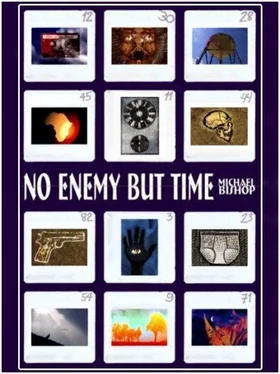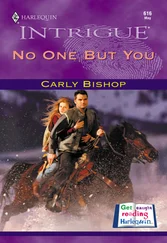I was still not alone. From the branches of the surrounding trees a throng of bandit-faced monkeys, probably vervets, had watched my run-in with the australopithecines. Ill-tempered elves in black-face, they leapt about excitedly, scolding and anathematizing me. I had chased off their big bipedal cousins.
Moreover, I was like nothing they had ever seen before.
“Quiet down, fellas,” I told them. “You’d better get used to this turn of events. A. robustus is going the way of five-cent cigars, 33-rpm records, and Cadillac convertibles.”
Startled by my voice, the vervets quieted: I got no more response from them than I had from Woody Kaprow over the transcordion. If A. robustus had not survived, I asked myself, what were my chances?
Kaprow had not permitted me to drink or eat for twelve hours before my dropback, and although I had been running all morning on willpower and adrenaline, I had just about depleted my reservoirs of both.
Besides, the sun told me that it was lunchtime. Not wishing to shoot a vervet—though their manners did not really warrant clemency—I gathered leaves from several different kinds of acacias and made myself a dry, unappetizing salad. I found water trickling through the mulch cover in the glade and drank long and hard to dislodge the pulpy residue of leaves sticking to my teeth. The meal was not very satisfactory, but I was not yet ready either to kill an antelope or to exploit the limited resources of my survival kit.
Not far away, through the clustering foliage of my temporary hideout, I saw a baobab. The Tree Where Man Was Born. In fact, I had seen three or four baobabs while crossing the savannah, but this one was close enough to study, admire, and approach. The baobab is an exclusively African tree, with a bole like the leg of an elephant trousered in baggy sailcloth and branches like enormous, naked nerve endings.
Leopards often use them for their headquarters. A Sambusai legend has it that an evil spirit pulled the first baobab out of the ground and replanted it upside-down, thus transposing its roots and its branches. Even so, an edible fruit grows high in the baobab, and if I could find a few, I would augment my lunch with some of these hard-shelled, woody delicacies, known to many Africans as “monkey bread.”
After determining that no leopard was present, I climbed the tree, using the numerous nodules and indentations about the trunk. I ate in its branches, confident that my.45 could fend off any intruder. Had the vervets in the acacia grove possessed automatic pistols, I reflected, they might have already stripped the tree of its burden of monkey bread.
When I came down from the baobab and hiked deeper into the forest strip, sweat began to pour off me.
My Right Guard had long since failed, and I was beginning to tire. After shedding my backpack and slinging my epaulet of nylon rope down beside it, I slumped to the ground for a breather. A tree trunk was at my back, and although the savannah was visible through the foliage to the southwest, I had no real apprehension of the carnivores out there. I was certainly at risk, but I was also so rare a creature that, simply by being a rarity, I felt I generated a kind of armor about myself. I rested my hands on my stomach, closed my eyes, and felt myself drifting… drifting… drifting into dreamland….
* * *
Drifting into dreamland.
If you adopt a literal interpretation of this phrase, a metaphysical puzzle presents itself.
My bodily venture into the distant past took place six years ago, when I was twenty-five. For the preceding quarter of a century, however, my every fourth or fifth dream had been a special one, an instance of what I had referred to, even as a child, as “spirit-traveling.” During these clairvoyant special dreams I visited, willy-nilly, the primeval landscapes of organic evolution in East Africa. Always a detached observer, I witnessed scenes that were commonplace in context but beautiful, bizarre, or frightening to one who had no waking experience or knowledge of such events. I had bucolic dreams in which hundreds of antelopes grazed in the somnolent heat of the savannah; horrifying dreams in which doglike animals tore the throats out of young or enfeebled gazelles and even devoured their own wounded; oddly poignant dreams in which naked quasi-people fed, cradled, or romped with their mischievous, monkeylike infants; and on and on. My spirit-traveling ranged across nearly the entire spectrum of Early Pleistocene life east of the Great Rift Valley. Some hologramic kernel in my collective unconscious opened up these vistas for me, and I tracked them in my sleep like the stylus on a seismograph recording the earth’s most subtle crustal movements.
Occasionally, although not often, events from our own era would become illogically commingled with my spirit-traveling. In the summer of 1969, for instance, not long after the first moon landing, I dreamed a prehistoric landscape into which a pair of astronauts in helmets and hulking white pressure suits emerged from a delicate lunar module. A volcano—probably Mount Tharaka—was erupting not far from their lander, and the air was filled with drifting ash. I could see the astronauts’ boots making herringbone patterns in the layers of buoyant soot blanketing the veldt. A pack of ragged hyenas, enormous creatures, came jog-trotting through the clouds of volcanic debris toward the men. While one of the astronauts performed dreamy slow-motion jumping jacks, his partner dispersed the hyenas by jabbing a stiff American flag at them….
Most of my spirit-traveling episodes, though, were pure, untainted by anachronism. Long before Kaprow’s White Sphinx Project, in fact, I had familiarized myself with dinotheres, giant baboons, australopithecines, and most of their extinct fellow travelers. Such creatures, after all, were the aboriginal denizens of my dreams; and I knew them by their behavior and their anatomy, if not by their multisyllabic scientific names, which I learned only later through study. Simply by drifting into dreamland, I had become an expert natural historian—minus the diplomas, the degrees, the publications, and the terminology—at an age when most kids still believe in the reality of Santa Claus and the Tooth Fairy.
This, then, is the metaphysical puzzle I am trying to pose: What sort of dreams must come to those who, through the dire expedient of time travel, have drifted into the objectified territory of their subconscious, a
“dreamland” that is no longer a dream but a palpable place? The answer is simple and perhaps not all that surprising. Such people will begin to dream about their native present, across the entire span of their lives before their actual bodily displacement into the past. They must relive their infancy, childhood, adolescence, and youth through the agency of spirit-traveling; and they must witness this procession of events at random, as if it were a slide program shuffled out of obvious sequence.
Sitting in a grove of acacia trees, two million years before my birth, I must have dreamed of my real mother and Spain, of Jacqueline Tru and the Mekong Restaurant, of President Tharaka and the Weightlessness Simulation Incline, of Mrs. Givens and Van Luna, Kansas. I do not recall exactly which of these dreams I dreamed that first day (for undoubtedly some of these dreams came later), but the upshot of all my dreaming was that every episode came to generate its own context and to coexist with every other—so that each moment I lived was a reenactment of every moment that had preceded it. I became my own history. I became myself.
* * *
Someone touched me. I opened my eyes and saw her. Acting on its own, my hand went to my hip and unbuttoned the flap on my.45’s leather holster. The lady who had prompted this reaction—by every appearance a protohuman creature—retreated a step or two into the shade of the acacias, but did not bolt like the skittish australopithecines I had met earlier. My stomach flip-flopped, and I tried to get to my feet.
Читать дальше



![Ally Carter - [Gallagher Girls 01] I'd Tell You I Love You But Then I'd Have to Kill You](/books/262179/ally-carter-gallagher-girls-01-i-d-tell-you-i-lo-thumb.webp)








